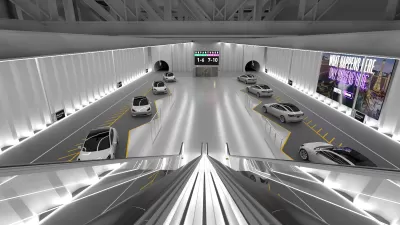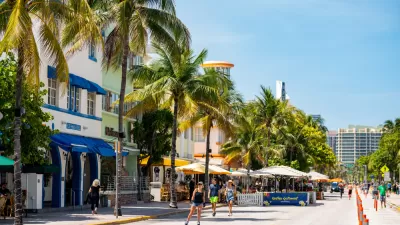Musk claims the tunnels could ease traffic and "be an example to the world," but experts caution that underground work in Miami is expensive and unpredictable.

In "yet another example of Musk’s perpetual grift of making empty promises to city leaders," writes Alissa Walker, the Tesla CEO is floating the idea of building car tunnels under the city of Miami through his tunnel-digging subsidiary, the Boring Company. Critics question the efficacy of underground tunnels in a city known as "the sinkhole capital of the United States," pointing to the "astronomical" costs of the rare few tunnels that have been built in the city. A Port of Miami tunnel that runs for less than a mile through a shallow channel cost roughly $1 billion to build, and it's unclear "whether or not the Boring Company has truly been able to cut tunneling costs."
Cost aside, another major issue facing any underground projects in Miami will be legal liability and the highly unpredictable effects of digging tunnels through unstable ground. "The ground beneath Miami is a highly dissolvable limestone karst that’s filled with cavities and caverns just like the sea floor," writes Walker, making it difficult to predict how a tunnel might affect the land and buildings above it. "Because part of the issue with the changing of the water table is that it won’t be a direct cause and effect — 30 blocks away is what is going to sink," says Mika McKinnon, a field geophysicist and disaster researcher, questioning Musk's plans for assessing legal liability. "This is not a feasible project without sinkholes, so what will they do when they get sued?"
McKinnon warns that investing in Miami's infrastructure may also be a lost cause in the long term thanks to the ravaging effects of climate change. "By 2100 it’s estimated that a large portion of Miami-Dade County will be rendered uninhabitable by up to five feet of rising ocean" and close to a million residents will face displacement. "It’s a lost city. It’s a zombie city. Buying coastal property in Miami is like throwing your money into the ocean."
FULL STORY: Elon Musk’s Plan to Dig Car Tunnels Under Miami Is Filled With Holes

Planetizen Federal Action Tracker
A weekly monitor of how Trump’s orders and actions are impacting planners and planning in America.

Restaurant Patios Were a Pandemic Win — Why Were They so Hard to Keep?
Social distancing requirements and changes in travel patterns prompted cities to pilot new uses for street and sidewalk space. Then it got complicated.

Map: Where Senate Republicans Want to Sell Your Public Lands
For public land advocates, the Senate Republicans’ proposal to sell millions of acres of public land in the West is “the biggest fight of their careers.”

Maui's Vacation Rental Debate Turns Ugly
Verbal attacks, misinformation campaigns and fistfights plague a high-stakes debate to convert thousands of vacation rentals into long-term housing.

San Francisco Suspends Traffic Calming Amidst Record Deaths
Citing “a challenging fiscal landscape,” the city will cease the program on the heels of 42 traffic deaths, including 24 pedestrians.

California Homeless Arrests, Citations Spike After Ruling
An investigation reveals that anti-homeless actions increased up to 500% after Grants Pass v. Johnson — even in cities claiming no policy change.
Urban Design for Planners 1: Software Tools
This six-course series explores essential urban design concepts using open source software and equips planners with the tools they need to participate fully in the urban design process.
Planning for Universal Design
Learn the tools for implementing Universal Design in planning regulations.
Heyer Gruel & Associates PA
JM Goldson LLC
Custer County Colorado
City of Camden Redevelopment Agency
City of Astoria
Transportation Research & Education Center (TREC) at Portland State University
Camden Redevelopment Agency
City of Claremont
Municipality of Princeton (NJ)





























